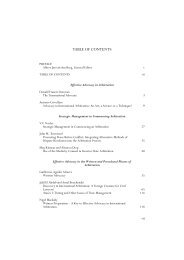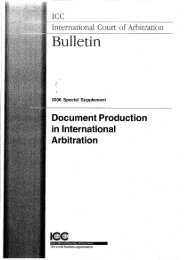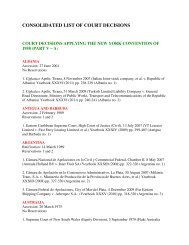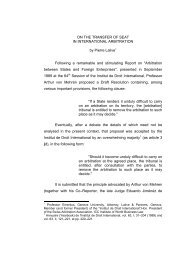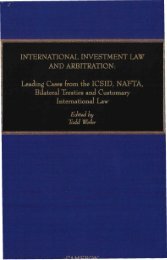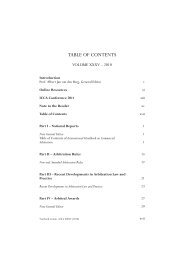Limits to Party Autonomy in International Commercial Arbitration
Limits to Party Autonomy in International Commercial Arbitration
Limits to Party Autonomy in International Commercial Arbitration
Create successful ePaper yourself
Turn your PDF publications into a flip-book with our unique Google optimized e-Paper software.
an ICC case. Court scrut<strong>in</strong>y of awards is an important feature of ICC arbitrations and the adm<strong>in</strong>ister<strong>in</strong>g<br />
body is unlikely <strong>to</strong> agree <strong>to</strong> waive it. 7<br />
Apart from manda<strong>to</strong>ry provisions of the law govern<strong>in</strong>g the arbitration agreement and the lex arbitri, and<br />
subject <strong>to</strong> "unacceptable" amendments <strong>to</strong> <strong>in</strong>stitutional rules, the parties enjoy very broad freedom <strong>in</strong><br />
select<strong>in</strong>g the arbitration regime they desire and <strong>in</strong> prescrib<strong>in</strong>g the procedure <strong>to</strong> be followed.<br />
After the Establishment of a Tribunal<br />
Once a dispute has arisen, an arbitration has been commenced and the tribunal has been established, the<br />
freedom of the parties <strong>to</strong> determ<strong>in</strong>e the arbitral procedure may be circumscribed. In particular the<br />
constitution of an arbitral tribunal br<strong>in</strong>gs <strong>in</strong><strong>to</strong> existence a new set of contractual relationships concern<strong>in</strong>g<br />
the arbitra<strong>to</strong>rs themselves.<br />
There has been some debate as <strong>to</strong> whether the rights and obligations of arbitra<strong>to</strong>rs stem from their "status"<br />
as arbitra<strong>to</strong>rs and arise directly from law or whether they arise from a contract which is entered <strong>in</strong><strong>to</strong> when<br />
they accept their appo<strong>in</strong>tment 8 . The view expressed <strong>in</strong> Fouchard, Gaillard & Goldman is that a contract<br />
does necessarily exist between the parties and the arbitra<strong>to</strong>rs; the contract is bi-lateral and creates rights<br />
and obligations for both the arbitra<strong>to</strong>rs and the parties. However, where an arbitration is adm<strong>in</strong>istered by<br />
an arbitral <strong>in</strong>stitution, the contractual relationship becomes triangular 9 .<br />
Mustill and Boyd take a contrary view. They argue that:<br />
"[t]o proceed by f<strong>in</strong>d<strong>in</strong>g a contract and then apply<strong>in</strong>g <strong>to</strong> it the ord<strong>in</strong>ary pr<strong>in</strong>ciples of the law of contract<br />
will not produce a reliable answer unless a contract really exists <strong>to</strong> be found. Even <strong>in</strong> the case of a<br />
massive reference, employ<strong>in</strong>g a professional arbitra<strong>to</strong>r for a substantial remuneration, we doubt whether<br />
a bus<strong>in</strong>ess man would, if he s<strong>to</strong>pped <strong>to</strong> th<strong>in</strong>k, concede that he was mak<strong>in</strong>g a contract when appo<strong>in</strong>t<strong>in</strong>g<br />
the arbitra<strong>to</strong>r. Such an appo<strong>in</strong>tment is not like appo<strong>in</strong>t<strong>in</strong>g an accountant, architect or lawyer. Indeed it is<br />
not like anyth<strong>in</strong>g else at all.<br />
We hope that the courts will recognise this, and will not try <strong>to</strong> force the relationship between the<br />
arbitra<strong>to</strong>r and party <strong>in</strong><strong>to</strong> an uncongenial theoretical framework, but will proceed directly <strong>to</strong> a<br />
consideration of what rights and duties ought, <strong>in</strong> the public <strong>in</strong>terest, <strong>to</strong> be regarded as attach<strong>in</strong>g <strong>to</strong> the<br />
status of arbitra<strong>to</strong>r." 10<br />
7 Accord<strong>in</strong>g <strong>to</strong> Craig, Park and Paulsson, "[t]he ICC Court will refuse <strong>to</strong> adm<strong>in</strong>ister an arbitration with party agreed<br />
modifications <strong>to</strong> the Rules only when a fundamental characteristic of ICC arbitration (such as Court scrut<strong>in</strong>y of the<br />
award) is omitted": Craig, Park Paulsson, "<strong>International</strong> Chamber of Commerce <strong>Arbitration</strong> (3rd ed, 2000), p. 295.<br />
8 The debate is well summarised <strong>in</strong> Fouchard, Gaillard, Goldman, p 600ff.<br />
9 Fouchard, Gaillard, Goldman, p601-602.<br />
10 Mustill and Boyd, "<strong>Commercial</strong> <strong>Arbitration</strong>" (2nd ed, 1989), p. 223.<br />
Legal\103364080.1 4



